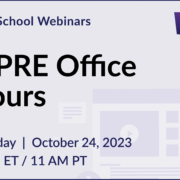Should I Take the MPRE as a 2L or 3L?
Should I Take the MPRE as a 2L or 3L?
The Multistate Professional Responsibility Examination (“MPRE”), is an exam based that centers on the ABA Rules of Professional Conduct. Almost all jurisdictions require students to take the MPRE in order to obtain an a license to practice law. Since the MPRE is required to become licensed in the vast majority of jurisdictions, many students wonder when they should think about taking the MPRE. Students can take the MPRE while they are still in law school! So when is the most opportune time to take the MPRE? Read on to learn the advantages/disadvantages of taking the MPRE as a 2L or 3L!
Should I Take the MPRE as a 2L or 3L?

What is the MPRE and what do I need to pass?
Starting with the most important information for law students, let’s discuss what the MPRE is as well as its purpose.
The National Conference of Bar Examiners offers the MPRE three times per year: October/November, March, and August. It’s important to note that students take the exam at Pearson VUE testing centers located throughout the country. The MPRE is submitted as part of the application to gain admittance to practice law in jurisdictions that require the MPRE. Therefore, if you live in New York but are in law school in California, you can take the MPRE in California and submit your score with your other application materials in New York. Each state provides information on how to obtain your score report.
Students receive MPRE scores that range from 50 to 150. Most jurisdictions require a score between 75 and 86 to pass, depending on the jurisdiction. We have a blog post that discusses MPRE score in more detail, including what score you will need to pass depending the jurisdiction where you’re taking the bar exam!
Steps to Take Before Taking the MPRE
First, it makes sense to take the professional responsibility course offered at your law school. Many schools offer (and require!) that you take a professional responsibility course as part of the regular curriculum. Even if the professional responsibility course at your school focuses on state-specific rules rather than the ABA Model Rules, it still will provide a deep background of the information you need to know for the MPRE. Further, most states model their version of the rules on the ABA Model Rules, so there is a lot of overlap.
Second, take an MPRE exam course. Many bar exam test prep companies (including us!) provide a free MPRE course. Not only does signing up for a free MPRE course help you better prepare for the MPRE, it also is a great way to test out different bar prep programs so you can see what is a good fit!
Third, make sure you have dedicate time to study for the MPRE. Students sometimes assume that they don’t need to study for the MPRE or that the MPRE is easy. While for most students, the MPRE is not as challenging as the bar exam, it is still a challenging test worthy of your time! Many students do not pass the MPRE on their first try, so setting aside time to study is key!
Finally, pay attention to deadlines! Students typically have to sign up to take the MPRE months in advance. Make sure you pay attention to not only the exam date, but the deadline to sign up. Additionally, if you are seeking accomodations, make sure you request them well in advance so you can make sure to have them in time for exam day.

What topics appear on the MPRE?
The MPRE essentially tests a student’s comprehension of the AB Model Rules of Professional Conduct (MRPC). Some topics appear more frequently than others. See below for a breakdown of topics most/least likely to appear on the MPRE:
- Conflicts of interest: 12–18% of questions; approximately to 6–9 questions per exam
- Litigation and other forms of advocacy: 10–16% of questions; approximately 5–8 questions per exam
- Lawyer-client relations: 10–16% of questions; approximately 5–8 questions per exam
- Competence, legal malpractice, and other civil liability: 6–12% of questions; approximately 3–6 questions per exam
- Client confidentiality: 6–12% of questions; approximately 3–6 questions per exam
- Regulation of the legal profession: 6–12% of questions; approximately 3–6 questions per exam
- Different roles of a lawyer: 4–10% of questions; approximately 2–5 questions per exam
- Communications about legal services: 4–10% of questions; approximately 2–5 questions per exam
- Safekeeping funds and other property: 2–8% of questions; approximately 1–4 questions per exam
- Transactions and communications with other persons: 2–8% of questions; approximately 1–4 questions per exam
- Judicial conduct: 2–8% of questions; approximately 1–4 questions per exam
- Lawyer’s duties to the public and legal system: 2–4% of questions; approximately 1–2 questions per exam
Want to know more? Check out our MPRE Topic Frequency Chart here for a visual representation of the issues that commonly appear on the MPRE.
Timing – When should you take the MPRE?
Due to these somewhat confusing and different state-to-state requirements for passing the MPRE, law students often wonder whether they should aim to take the MPRE. Most students gravitate toward taking the MPRE after they have completed their law school’s professional reponsibilitiy course. This allows students to approach the MPRE with course information fresh in their mind. However, if you are taking professional reponsibilities during spring semester of your 3L year, you might find yourself having to take the MPRE before or during the time you are taking professional responsibilities to avoid taking the MPRE after the bar exam.
Additionally, many students prefer to take the MPRE after their 2L year or early on in their 3L year to provide some cushion in the event they do not pass the first time. This gives them one or two more MPRE administrations before the bar exam to boost their score! Make sure to carefully research the rules of the jurisdiction where you’re seeking to be licensed, though! Some states restrict the number of times students can take the MPRE!
Impacts of Waiting Too Long
The timing of when a law student sits for and passes the MPRE is crucial. Why? Because sometimes if a student waits until after the bar exam to take (or re-take) their MPRE it may hold up their admissions to their state bar. If you wait too long to take the MPRE (meaning, you have not yet passed the MPRE before you take a bar exam) you may hold up your admission to the bar!
Additionally, after studying for and taking the bar exams, most students need a mental break from studying. Immediately jumping in to study for the MPRE immediately following the bar exam is probably the last thing that you want to do, especially if you’re experiencing a lot of bar exam burnout.

MPRE Tips
Learn and memorize the rules of professional conduct before diving into practice questions.
Memorizing and being able to recall rules is key to excelling on the MPRE. Students often incorrectly think they should jump into taking practice tests. However, attempting practice questions does not always equate to memorizing and understanding key concepts. Instead, starting out with an outline that incorporates rules or the rules themselves is the best way to start your studies!
Review MPRE keywords and phrases.
MPRE questions tend to use very similarly worded calls of the question. “Is this lawyer subject to discipline?” is one example that often comes up in the MPRE. Other ways of asking this question include “is this lawyer subject to litigation sanctions?” or “is this lawyer subject to civil liability?” Knowing MPRE keywords and phrases helps to make the process of eliminating incorrect answers so much simpler because you’ll know what “subject to discipline,” “subject to litigation sanctions,” or “subject to civil liability” all mean.
JD Advising has several resources that discuss MPRE keywords and phrases. This includes an in-depth blog post about the keywords and phrases, a discussion about keywords and phrases as part of JD Advising’s MPRE Guide, and an MPRE One-Sheet.
Spend your time wisely: learn highly tested topics.
If your time to study for the MPRE is limited, it makes sense to get more bang for your buck by focusing on areas most likely to be tested. Our MPRE One-Sheet and MPRE Crash Course provide a breakdown of what topics are on the MPRE and further provide a percentage of how much of the MPRE is based on certain topic areas.
Use real MPRE practice questions.
There is no substitute for using real MPRE practice questions as you study for the exam. The NCBE periodically releases a number of previous MPRE questions. These questions are offered across various platforms for purchase, including through both the NCBE as well as JD Advising’s website.
Looking to Ace the MPRE?
- Enroll in our 5-star rated free MPRE Course, complete with expert guidance, an exclusive outline, practice questions, and a one-sheet.
- Tackle the Real MPRE questions — the gold standard for test preparation.
- Elevate your preparation with personalized MPRE private tutoring, featuring a tailored study plan and dedicated MPRE outline.
- Dive into our assortment of complimentary top-notch MPRE resources for your success.







Leave a Reply
Want to join the discussion?Feel free to contribute!